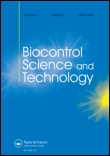
BIOCONTROL SCIENCE AND TECHNOLOGY
Scope & Guideline
Cultivating Sustainable Practices Through Rigorous Research
Introduction
Aims and Scopes
- Biological Control Agents:
The journal emphasizes the use and evaluation of various biological control agents, including bacteria, fungi, nematodes, and parasitoids, in the management of agricultural pests and diseases. - Plant-Microbe Interactions:
Research on the interactions between plants and microbial agents, including how these interactions can enhance plant health and promote resistance to diseases. - Ecological and Environmental Impact Studies:
The journal includes studies that assess the ecological consequences of introducing biological control agents, focusing on non-target effects and biodiversity. - Innovative Formulations and Applications:
Publishing innovative approaches to formulate and apply biological control agents, including the use of nanotechnology, bioactive compounds, and biopesticides. - Integrated Pest Management (IPM) Strategies:
The journal supports research that integrates biological control methods within broader IPM frameworks to promote sustainable agricultural practices.
Trending and Emerging
- Microbial Biocontrol Agents:
An increasing number of studies focus on microbial agents, particularly actinobacteria and fungi, showcasing their potential in controlling various pests and pathogens in agriculture. - Plant Defense Mechanisms:
Research exploring how biological control agents can induce systemic resistance in plants is gaining traction, emphasizing the role of biocontrol in enhancing plant health. - Use of Nanotechnology:
The application of nanotechnology in formulating biological control agents is emerging as a promising area, aiming to improve the efficacy and stability of these agents. - Sustainable Agriculture Practices:
There is a marked trend towards integrating biological control within sustainable agricultural practices, reflecting a broader movement towards eco-friendly pest management solutions. - Host-Specificity and Non-Target Effects:
Emerging studies are increasingly focused on the host-specificity of biological control agents and their potential non-target impacts, indicating a shift towards more responsible biocontrol research.
Declining or Waning
- Classical Biological Control:
The traditional focus on classical biological control methods appears to be waning, as interest shifts towards integrated and innovative biological control approaches that consider ecological dynamics. - Chemical Control Comparisons:
There is a noticeable decline in studies that directly compare biological control agents with chemical pesticides, possibly due to a growing emphasis on sustainable practices and the avoidance of chemical inputs. - Nematode Studies:
Research focused specifically on nematodes as biological control agents has decreased, which may indicate a shift towards exploring more diverse biological agents or broader ecological interactions. - General Pest Control Assessments:
Studies examining pest control efficacy without a strong biological context are becoming less common, as the journal pivots towards more specific and detailed investigations involving biological interactions.
Similar Journals
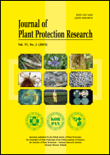
JOURNAL OF PLANT PROTECTION RESEARCH
Empowering sustainable agriculture with cutting-edge insights.JOURNAL OF PLANT PROTECTION RESEARCH is a pivotal publication in the realm of agricultural sciences, dedicated to advancing our understanding of plant protection and pest management. Published by the INST OCHRONY ROSLIN, PANSTWOWY INST BADAWCZY in Poland, this journal has been an open-access venue since 2008, ensuring that research findings are readily accessible to a global audience. With an ISSN of 1427-4345 and E-ISSN of 1899-007X, it serves as a crucial platform for scholars and practitioners in the fields of Agronomy, Plant Science, and Soil Science. In the latest categorizations, it has achieved a Q3 ranking in these disciplines, reflecting its impact and significance within the scientific community. As the journal converges its scope from 2008 to 2024, it continues to address pressing issues in plant health and sustainability. Its strategic placement within the Scopus ranks offers valuable insights into agricultural and biological sciences, making it an essential read for those seeking to enhance their expertise in plant protection strategies.
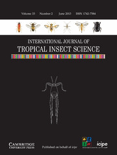
INTERNATIONAL JOURNAL OF TROPICAL INSECT SCIENCE
Connecting Scholars in Tropical Insect ScienceINTERNATIONAL JOURNAL OF TROPICAL INSECT SCIENCE, published by Springer International Publishing AG, is a leading interdisciplinary journal dedicated to advancing knowledge in the fields of insect science and ecology. With its ISSN 1742-7584 and E-ISSN 1742-7592, this journal provides a platform for researchers to publish high-quality, peer-reviewed articles that explore various aspects of tropical insect biology, behavior, and their ecological impacts. As evidenced by its Q3 ranking in both Ecology, Evolution, Behavior and Systematics and Insect Science, it plays a vital role in fostering scientific dialogue and innovation within these disciplines. Researchers affiliated with the journal benefit from its visibility and growing impact, as demonstrated by its Scopus ranks, with a percentile standing of 61st in Insect Science. Although the journal is not open access, it still reaches a wide academic audience, making significant contributions to our understanding of tropical ecosystems. Situated in Switzerland, this journal is crucial for students, professionals, and researchers invested in the intersection of entomology and ecological science.
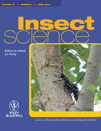
Insect Science
Connecting disciplines through the lens of insect science.Insect Science, published by WILEY, stands as a prestigious journal in the realms of Agronomy, Biochemistry, Genetics, and Insect Ecology. The journal, with ISSN 1672-9609 and E-ISSN 1744-7917, has firmly established itself as a significant resource for researchers and professionals seeking to explore the intricate dynamics of insects and their crucial roles in ecosystems. With a remarkable impact factor placing it in the Q1 quartile across multiple categories, including Ecology and Evolution and Agronomy and Crop Science, Insect Science ranks impressively at #8 out of 181 in the realm of Insect Science on Scopus, showcasing its influence and relevance in the field. Spanning its coverage from 1994 to 2024, this journal invites contributions that advance our understanding of insect biology, behavior, and their interactions within agricultural contexts. The commitment to high-quality research and its role in fostering interdisciplinary dialogue make Insect Science an essential platform for scholars and practitioners at the forefront of insect-related studies.
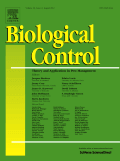
BIOLOGICAL CONTROL
Connecting Scholars to Shape Sustainable AgricultureBIOLOGICAL CONTROL, published by Academic Press Inc Elsevier Science, is a prestigious journal focusing on the advancement of knowledge in the field of biological pest control and integrated pest management. With a high-impact factor reflecting its significant contributions to agronomy and insect science, it has secured elite positions in both Q1 categories as of 2023. The journal ranks within the top 6% and 12% of its fields on Scopus, making it an essential resource for researchers and professionals dedicated to sustainable agricultural practices and ecological balance. With its comprehensive exploration of theoretical and applied studies from 1991 to 2024, BIOLOGICAL CONTROL serves as a critical platform for disseminating innovative research and promoting dialogue among scholars, students, and practitioners. Although the journal follows a subscription-based access model, it consistently attracts contributions that shape the future of pest management strategies.
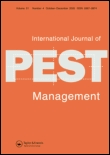
INTERNATIONAL JOURNAL OF PEST MANAGEMENT
Empowering researchers with critical insights into pest dynamics.The INTERNATIONAL JOURNAL OF PEST MANAGEMENT, published by TAYLOR & FRANCIS LTD, is a prestigious academic journal that has established itself as a vital resource in the fields of Agronomy, Crop Science, and Insect Science. With an ISSN of 0967-0874 and E-ISSN 1366-5863, this journal has been disseminating critical research since its inception in 1993 and continues to shape the discourse through to 2024. The journal occupies a significant position in the academic community, currently ranked Q2 in Agronomy and Crop Science and Q3 in Insect Science, based on its impressive Scopus ranks (Agricultural and Biological Sciences: Insect Science rank #33/181; Agronomy and Crop Science rank #109/406). Offering rapid insights into pest management strategies, this journal is essential for researchers, professionals, and students seeking to enhance their understanding of pest dynamics and management practices in an agronomic context. Though it does not provide open access options, its rigorous peer-review process ensures high-quality, impactful publications that contribute significantly to sustainable agricultural practices.

Revista Caatinga
Unlocking Insights for Global Agricultural ChallengesRevista Caatinga is a premier open-access journal published by Universidade Federal Rural do Semi-Árido (UFERSA), dedicated to the dissemination of significant research within the field of Agricultural and Biological Sciences. Since its inception in 2006, the journal has aimed to bridge the knowledge gap in various aspects of agricultural practices and biological phenomena, making vital contributions to the scientific community. With its publications indexed in Scopus and holding an impressive Q2 categorization in the competitive landscape of agricultural sciences, the journal ranks within the top half of its category (100/221), demonstrating a commitment to quality scholarship. The journal is based in Brazil and covers a wide array of topics relevant to both local and global agricultural challenges. By fostering open access, Revista Caatinga ensures that vital research is available to a broad audience, promoting knowledge sharing and collaboration among researchers, practitioners, and students around the world.
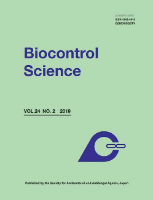
BIOCONTROL SCIENCE
Connecting scholars to foster interdisciplinary biocontrol advancements.BIOCONTROL SCIENCE, published by the SOC ANTIBACTERIAL & ANTIFUNGAL AGENTS in Japan, is an esteemed journal that focuses on the dynamic fields of Applied Microbiology and Biotechnology, as well as Public Health. With an ISSN of 1342-4815 and an E-ISSN of 1884-0205, this journal has been an important platform for disseminating research findings, contributing to its recognized Q3 quartile ranking in both fields as of 2023. Although the journal's H-index is yet to be established, its coverage from 1996 to 2022 showcases a solid foundation of scholarly works in biocontrol mechanisms, antifungal and antibacterial strategies, and their implications for health and the environment. Researchers and professionals will find valuable access options, further enhancing the journal's reach and impact within the scientific community. The journal serves as a critical resource, promoting knowledge sharing and innovation in tackling global health challenges, fostering interdisciplinary collaborations, and encouraging impactful research in biocontrol technologies.

PHYTOPARASITICA
Illuminating the Dynamics of Plant and Insect Relationships.PHYTOPARASITICA, published by SPRINGER in the Netherlands, is a distinguished journal dedicated to the fields of Insect Science and Plant Science. With an impressive convergence of research from 1973 to 2024, the journal holds a notable position in academic circles, ranking in Q2 for both categories as of 2023, according to Scopus metrics. This places PHYTOPARASITICA within the top 67th percentile for Insect Science and the 59th percentile for Plant Science, reflecting its significant impact on research and advancements in these crucial fields. The journal is committed to disseminating high-quality, peer-reviewed research that addresses the interplay between plants and their parasitic organisms, contributing to the broader understanding of agricultural sustainability and ecological balance. Researchers, professionals, and students will find this journal an essential resource for cutting-edge insights and developments within its domain.
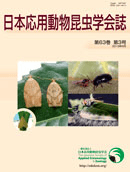
JAPANESE JOURNAL OF APPLIED ENTOMOLOGY AND ZOOLOGY
Unveiling the Secrets of Insect Behavior and EcologyJapanese Journal of Applied Entomology and Zoology is a premier publication in the field of Insect Science, offering a platform for researchers and practitioners to share their findings on applied entomology and zoology. Established in 1957 and published by the Japan Society of Applied Entomology and Zoology, this journal aims to foster the understanding of insect-related studies that impact agriculture, ecology, and biodiversity. With an ISSN of 0021-4914 and E-ISSN of 1347-6068, it serves as a crucial resource for both academics and industry professionals. While the journal currently resides in the Q4 category of the Scopus ranking for Insect Science with a percentile of 11th, it plays a significant role in providing valuable insights into insect behavior, systematics, and their ecological roles. Readers can benefit from its published research to drive innovations and solutions in pest management and conservation practices. As the journal continues to evolve, it reinforces its commitment to disseminating critical research that supports sustainable practices in entomology and zoology through its convergence extending to the year 2024.
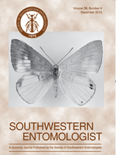
SOUTHWESTERN ENTOMOLOGIST
Innovating Solutions through Entomological ResearchSOUTHWESTERN ENTOMOLOGIST is a pivotal academic journal dedicated to advancing the fields of Agronomy, Ecology, and Insect Science. Published by the SOUTHWESTERN ENTOMOLOGICAL SOC in the United States, this journal plays a crucial role in disseminating vital research findings that address pressing ecological and agricultural challenges. With its ISSN 0147-1724 and E-ISSN 2162-2647, the journal has been publishing comprehensive studies since 1993 and continues to contribute significantly to the knowledge base up to 2024. As a Q4 ranked journal in both Agronomy and Crop Science and Ecology, as well as Insect Science, it provides an inclusive platform for researchers and students to share their insights and foster collaborations. Although it currently does not offer open access options, the content is accessible to academic institutions and professionals, ensuring that significant findings reach a broad audience. Given its niche focus, SOUTHWESTERN ENTOMOLOGIST not only appeals to researchers and students but also to professionals looking to stay updated on the latest trends and developments in entomology and its related fields.